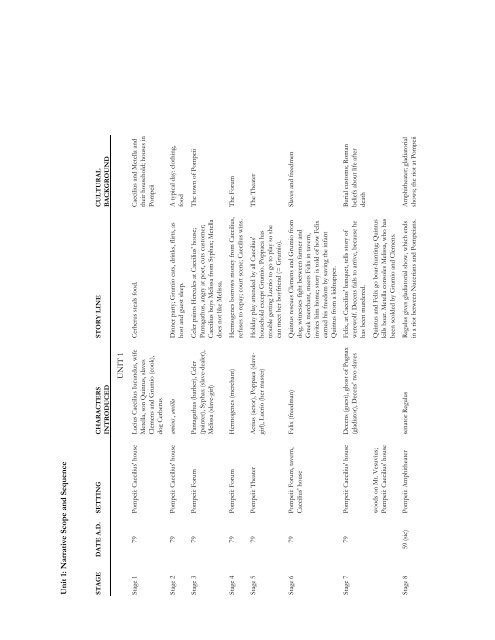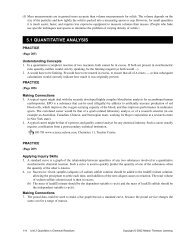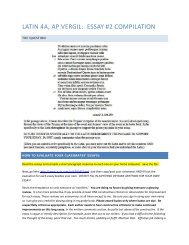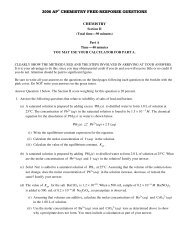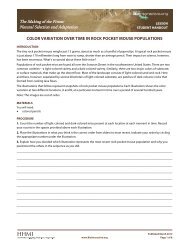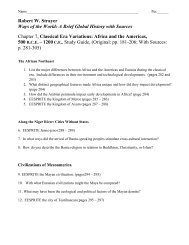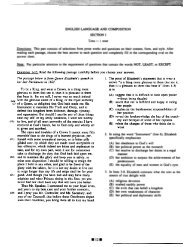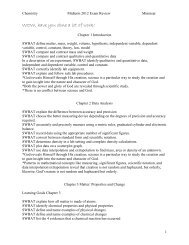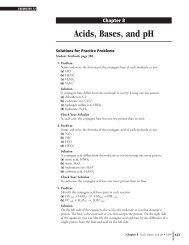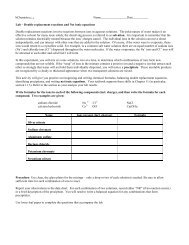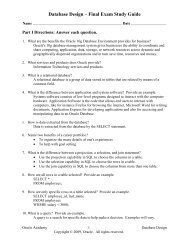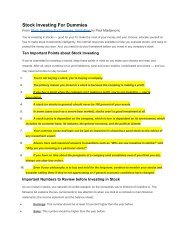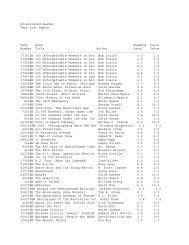CLC Culture Guide - Quia
CLC Culture Guide - Quia
CLC Culture Guide - Quia
You also want an ePaper? Increase the reach of your titles
YUMPU automatically turns print PDFs into web optimized ePapers that Google loves.
Unit 1: Narrative Scope and Sequence<br />
STAGE DATE A.D. SETTING CHARACTERS<br />
INTRODUCED<br />
UNIT 1<br />
STORY LINE CULTURAL<br />
BACKGROUND<br />
dog Cerberus<br />
Clemens and Grumio (cook Metella, son Quintus, slaves<br />
Pompeii: Caecilius' house ),<br />
wife<br />
Cerberus steals food. Caecilius and Metella and<br />
their household; houses in<br />
Pompeii<br />
Stage 2 79 Pompeii: Caecilius' house amicus , ancilla Dinner party; Grumio eats, drinks, flirts, as A typical day: clothing,<br />
host and guest sleep.<br />
food<br />
Stage 3 79 Pompeii: Forum Pantagathus (barber), Celer<br />
(painter), Syphax (slave-dea ler),<br />
Melissa (slave-girl)<br />
does not like Melissa.<br />
Caecilius buys Melissa from Syphax; Pantagathus, angry at poet, cuts cust Celer paints Hercules at Caecilius' ho Metella<br />
omer;<br />
use;<br />
The town of Pompeii<br />
Stage 4 79 Pompeii: Forum Hermogenes (merchant) Hermogenes borrows money from C<br />
refuses to repay; court scene; Caecilius wins.<br />
aecilius, The Forum<br />
Stage 5 79 Actius (actor), Poppaea (sla girl), Lucrio (her master) Pompeii: Theater can meet her boyfriend (= Grumio).<br />
trouble getting Lucrio to go to play s household except Grumio. Poppaea ve- Holiday play attended by all Caeciliu o s'<br />
she<br />
has<br />
The Theater<br />
Stage 6 79 Pompeii: Forum, tavern , Felix (freedman) Quintus rescues Clemens and Grum io from<br />
Caecilius' house<br />
dog, witnesses fight between farmer and<br />
Greek merchant, meets Felix in tave rn,<br />
invites him home; story is told of ho w Felix<br />
ant<br />
earned his freedom by saving the inf<br />
Quintus from a kidnapper.<br />
Slaves and freedmen<br />
Stage 7 79 Pompeii: Caecilius' house Decens (guest), ghost of Pugnax<br />
(gladiator), Decens' two slaves<br />
has been murdered.<br />
werewolf. Decens fails to arrive, bec Felix, at Caecilius' banquet, tells stor ause he<br />
y of<br />
Burial customs; Roman<br />
beliefs about life after<br />
death<br />
woods on Mt. Vesuvius;<br />
Pompeii: Caecilius' house<br />
Quintus and Felix go boar-hunting; Quintus<br />
kills boar. Metella consoles Melissa, who has<br />
been scolded by Grumio and Clemens.<br />
Stage 8 59 (sic) Pompeii: Amphitheater senator Regulus Regulus gives gladiatorial show, whic<br />
in a riot between Nucerians and Pompeians.<br />
h ends Amphitheater; gladiatorial<br />
shows; the riot at Pompeii
'<br />
Stage 9 79 Pompeii: baths Milo (athlete); Sceledrus,<br />
Anthrax (public slaves)<br />
Anthrax apprehend a toga thief.<br />
it and damages Milo's statue. Sceledr Caecilius. Milo hurls discus; Quintus Quintus' birthday visit to baths with<br />
us and<br />
throws<br />
Pompeii: the Forum Marcellus (mercator ) Metella and Melissa buy Quintus a new toga<br />
for his birthday.<br />
Stage 10 79 Pompeii: school<br />
Pompeii: Alexander's<br />
house<br />
Pompeii: tavern<br />
s Alexander)<br />
and Thrasymachus (brother (friend of Quintus), Diodor Theodorus (teacher), Alexan of<br />
us<br />
der<br />
Debate: "Greeks are better than Rom<br />
Alexander wins: "Romans are imitato<br />
Quarrel over 3 presents for Alexand<br />
brothers: Quintus settles by taking o<br />
himself.<br />
Syphax pays tavern bill with old Egy<br />
ring; bad luck comes to all. Grumio<br />
Poppaea eventually find it. What wil<br />
to them?<br />
ans";<br />
rs."<br />
er's 2<br />
ne for<br />
ptian<br />
and<br />
l happen<br />
Stage 11 March 79 Pompeii: around the town<br />
d<br />
(i.e. house of Marcus an<br />
Quartus, near the<br />
Amphitheater, Caecilius<br />
house, the Forum)<br />
and Afer (candidates)<br />
Sulla (sign-painter), Holcon Marcus and Quartus (broth ius<br />
ers),<br />
Sulla makes profit by painting signs f or<br />
brothers advertising their candidates. Grumio<br />
tries to earn money by voting illegally.<br />
Clemens earns 10 denarii by rescuing<br />
Caecilius from riot, goes out with Poppaea.<br />
Stage 12 August 24,<br />
79<br />
Nuceria, Pompeii: day o f Julius (friend of Caecilius) Turmoil: Clemens saves Julius, who then<br />
eruption<br />
flees. Clemens finds Caecilius dying .<br />
Caecilius orders Clemens to find Quintus and<br />
Clemens<br />
give him signet ring. Caecilius dies,<br />
departs, Cerberus stands guard.<br />
The Baths<br />
Education; writing<br />
materials<br />
Local government and<br />
elections<br />
The eruption of Vesuvius;<br />
excavation of Pompeii
Unit 2: Narrative Scope and Sequence<br />
STAGE DATE A.D. SETTING CHARACTERS<br />
INTRODUCED<br />
UNIT 2<br />
Stage 13 Autumn, 82 Britain: Salvius' country<br />
estate<br />
Stage 14 Autumn, 82 Britain: Salvius' country<br />
estate<br />
Gaius Salvius Liberalis (circuit<br />
judge in southern Britain),<br />
Rufilla (Salvius' wife), Varica<br />
(farm manager), Philus<br />
(accountant), Volubilis (house<br />
cook), Bregans (farm slave),<br />
Loquax and Anti-Loquax (slaveboys),<br />
Pompeius Optatus (mine<br />
manager), Alator (mine slave),<br />
Cervix (head plowman)<br />
Marcia (old slave-woman),<br />
Domitilla (slave-girl)<br />
Stage 15 October 13,<br />
82<br />
Britain: Cogidubnus'<br />
palace<br />
Cogidubnus (king of the<br />
Regnenses), Belimicus<br />
(Cantiacan chieftain), Dumnorix<br />
(Regnensian chieftain)<br />
STORY LINE CULTURAL<br />
BACKGROUND<br />
Varica reports that Salvius, who killed a mine<br />
slave, has been wounded by slave's son.<br />
Salvius has demanded revenge. At inspection<br />
of estate slaves, Slavius strikes Bregans; the<br />
dog being led by Bregans attacks Salvius, but<br />
cannot be killed, because it is a gift of King<br />
Cogidubnus. Salvius orders Cervix sold<br />
because he is sick.<br />
British tribal system;<br />
invasions of Caesar and<br />
Claudius; Romanization;<br />
the career of Salvius<br />
Salvius and Rufilla quarrel over country<br />
estate. Domitilla gets Volubilis to do her<br />
work. Rufilla uses Salvius' best furnishings to<br />
decorate a room for her relative Quintus.<br />
Quintus, who came earlier to Britain from<br />
Pompeii, has a present for Cogidubnus better<br />
than Salvius'.<br />
Life in Roman Britain:<br />
houses, mining, farming,<br />
slavery.<br />
Cogidubnus sacrifices to deified Emperor<br />
Claudius and cremates his effigy. Boat race<br />
between Belimicus and Dumnorix: Belimicus'<br />
recklessness leads to shipwreck, Dumnorix<br />
wins.<br />
The reaction of various<br />
Celtic chiefs to the arrival<br />
of the Romans: Boudica,<br />
Cartimandua,<br />
Cogidubnus.
Stage 16 Winter, 82<br />
Flashback:<br />
Winter 79 -<br />
Autumn 80<br />
Stage 17 Flashback<br />
(cont.):<br />
Winter, 80<br />
Stage 18 Flashback<br />
(cont.):<br />
Winter 80<br />
Stage 19 Flashback<br />
(cont.):<br />
March 5, 81<br />
Flashback<br />
(cont.):<br />
Spring, 81<br />
Britain: Cogidubnus'<br />
palace<br />
Alexandria: around the<br />
city<br />
Alexandria: glass stores of<br />
Clemens and Eutychus<br />
Alexandria: city and<br />
harbor<br />
Barbillus' estate on Nile<br />
river<br />
Emperor Vespasian Belimicus tries to get revenge on Dumnorix<br />
by introducing a trained bear at a banquet.<br />
Bear attacks Cogidubnus; Quintus kills it.<br />
Quintus tells king his sad story: he sold his<br />
father's estates in the winter of 79, visited<br />
Athens in the spring and summer of 80, and<br />
moved to Alexandria in the autumn of 80.<br />
Cogidubnus tells Quintus about his palace:<br />
Emperor Vespasian built it in gratitude for<br />
the king's help during Roman invasion of<br />
Britain.<br />
Barbillus (wealthy merchant),<br />
Diogenes (Greek friend of<br />
Barbillus), Plancus (a bore)<br />
Quintus, visiting Barbillus in Alexandria, is<br />
given Egyptian slave, who is killed when<br />
crowd attacks Diogenes' house where<br />
Quintus has taken refuge. Plancus bores<br />
Barbillus and Quintus en route to the Temple<br />
of Serapis. Barbillus tells story of Arab<br />
merchant carried off by monstrous bird,<br />
from whose nest he stole jewels now owned<br />
by Barbillus.<br />
Eutychus ("protection"<br />
racketeer)<br />
Clemens, for whom Quintus has bought a<br />
glass store, is harassed by Eutychus and his<br />
gang for refusal to pay protection money. He<br />
is saved by cat, sacred to goddess Isis, whose<br />
devotee Clemens has become.<br />
Aristo (Greek amateur<br />
tragedian), Galatea (his wife),<br />
Helena (their daughter)<br />
Family quarrels between Aristo, Galatea, and<br />
Helena provide a comic interlude to sacred<br />
procession of goddess Isis.<br />
Phormio (Barbillus' estatemanager),<br />
Barbillus' personal<br />
astrologer<br />
Barbillus' astrologer warns him against<br />
hunting; Barbillus goes hunting anyway, but,<br />
attacked by a hippopotamus and crocodile, is<br />
wounded in melee by a spear.<br />
The Palace at Fishbourne<br />
Alexandria<br />
Glassmaking; the Romans<br />
in Egypt<br />
The worship of Isis
Stage 20 Flashback<br />
(cont.):<br />
Spring, 81<br />
Barbillus' estate on Nile<br />
river<br />
Petro (Greek doctor), Plotina<br />
(Barbillus' [deceased] wife),<br />
Rufus (their son)<br />
Astrologer's superstitious cures are scorned<br />
by Petro. Barbillus tells Quintus how his wife<br />
and son sailed to Greece against advice of<br />
astrologer. Plotina drowned at sea; he<br />
disinherited Rufus, who is now in Roman<br />
army in Britain. Barbillus dies of astrologer's<br />
cure, but first commissions Quintus to find<br />
Rufus and assure him of his father's<br />
forgiveness. Last will and testament of<br />
Barbillus.<br />
Medicine, science and<br />
technology
Unit 3: Narrative Scope and Sequence<br />
STAGE DATE<br />
A.D.<br />
SETTING CHARACTER<br />
INTRODUCED<br />
S STORY LINE CULTURAL<br />
BACKGROUND<br />
UNIT 3<br />
Stage 21 Spring,<br />
A.D. 83<br />
and Aquae Sulis palace at Fishbo Britain: Cogidub (Bath)<br />
urne,<br />
nus'<br />
Cephalus (his f shrine at Aquae (haruspex, and Lucius Marcius reedman)<br />
Sulis),<br />
director of<br />
Memor<br />
Cephalus to kill the Cogidubnus. In tu Sulis, Salvius order advises him to mak Aquae Sulis for a h Cogidubnus wond king.<br />
rn, Memor orders<br />
s Memor to kill<br />
e his will. In Aquae<br />
ealth cure. Salvius<br />
ers whether to go to<br />
Romano-British town of<br />
Aquae Sulis, its baths and<br />
temple complex.<br />
Stage 22 Spring,<br />
A.D. 83<br />
S Modestus and (Bath)<br />
Britain: Aquae Gutta (Bulbus' Bulbus (Vilbia's Rubria (Latro's (local innkeepe (Roman soldier ulis friend)<br />
lover),<br />
daughters),<br />
r), Vilbia and<br />
s), Latro<br />
S trythio<br />
Roman soldier from become infatuated Vilbia, an innkeepe the Second Legion<br />
with Modestus, a<br />
r's daughter, has<br />
on leave in Aquae Sulis, and has rejected<br />
is reunited with Bu rejects Vilbia. Afte where Modestus b Modestus into the distract Modestus. Gutta, to imperson between. Bulbus c<br />
Strythio, Modestus her previous boyfr lbus.<br />
r hearing this, Vilbia<br />
egs for mercy and<br />
sacred spring from<br />
Then Bulbus shoves<br />
ate Vilbia and<br />
onvinces his friend,<br />
' friend, acts as goonvinces<br />
iend, Bulbus.<br />
Magic, curses, and<br />
superstitions.
Stage 23 Spring,<br />
A.D. 83<br />
Stage 24 Spring,<br />
A.D. 83<br />
Britain: Aquae Sulis<br />
(Bath)<br />
Britain: various locales Gnaeus Julius A gricola<br />
(governor of B ritain)<br />
Cephalus offers Co<br />
which has poisone<br />
Quintus has seen a similar cup in Egypt,<br />
he stops the king f<br />
Dumnorix forces C<br />
cup's contents. Ce<br />
of Cephalus' delive<br />
Cogidubnus which<br />
complicity. Cogidu<br />
dismiss Memor fro<br />
baths. Salvius inte<br />
Cogidubnus under<br />
gidubnus a cup<br />
d contents. Because<br />
rom drinking.<br />
ephalus to drink the<br />
phalus dies. A slave<br />
rs a letter to<br />
reveals Memor's<br />
bnus attempts to<br />
m his position at the<br />
rvenes and puts<br />
house arrest.<br />
s them.<br />
wounded when the Dumnorix is killed incriminating letter Dumnorix. Salviu thirty horsemen to Meanwhile, Salvius and gallop north in two steal horses be Agricola, who outr Cogidubnus. Quin Quintus' house, an Dumnorix eludes S the Regnenses to b cross it. Salvius or collapses when Mo A comic interlude horsemen attack<br />
and Quintus is<br />
to Agricola.<br />
also sends an<br />
arrest Quintus and<br />
sends Belimicus and<br />
search of Agricola.<br />
longing to Salvius<br />
anks Salvius. The<br />
tus suggests going to<br />
d seeks assistance for<br />
alvius' men, goes to<br />
e arrested.<br />
ders all chieftains of<br />
destus attempts to<br />
where a bridge<br />
Roman religion, astrology.<br />
Travel and<br />
communication in the<br />
Roman world.
Stage 25 Spring,<br />
A.D. 83<br />
Stage 26 Spring,<br />
A.D. 83<br />
y (Chester)<br />
fortress at Deva Britain: legionar Deceanglian ch Vercobrix (son Valerius (centu ieftain)<br />
of<br />
rion),<br />
y (Chester)<br />
fortress at Deva Britain: legionar Legion)<br />
(commander of Gaius Julius Silanus<br />
Second<br />
t punishment.<br />
Strythio flee in ord inefficiency, he esc because of their in and Strythio are se at Deva (modern C chieftain, is caught Vercobrix, son of er to avoid<br />
apes. Modestus and<br />
attention and<br />
nt to guard him, but,<br />
hester). Modestus<br />
spying on the camp<br />
he Deceanglian<br />
The legionary solder; the<br />
auxiliaries.<br />
treason of Cogidub are waiting to tell h camp at Deva. Salvius The soldiers welco nus. An exhausted<br />
im of the supposed<br />
and Belimicus<br />
me Agricola to the<br />
and wounded Quintus makes a dramatic<br />
announces the dea over tribes in the n tribute from the pr informs him that t apologize to Cogid for Quintus. Agric because of his fath himself as Barbillu the course of doing military tribunes, q innocent. Rufus, o Roman citizen and entrance, proclaim th of Cogidubnus.<br />
orth. A messenger<br />
ovinces, not victories<br />
he emperor wants<br />
ubnus, but Salvius<br />
ola orders Salvius to<br />
er's letter can vouch<br />
s' long-lost son, and<br />
this, Rufus reveals<br />
uestions Quintus. In<br />
ne of Agricola's<br />
that Cogidubnus is<br />
ing that he is a<br />
Organization of the<br />
legion; senior officers;<br />
Agricola.
Stage 27 Spring,<br />
A.D. 83<br />
y (Chester)<br />
fortress at Deva Britain: legionar Nigrina (dancin of Modestus an Aulus and Pub g girl)<br />
d Strythio),<br />
licus (friends<br />
Stage 28 Spring,<br />
A.D. 83<br />
Cogidubnus' palace and<br />
the area nearby.<br />
Stage 29 Flashbac k: Rome: Arch of Titus,<br />
September, Mamertine priso n<br />
A.D. 81<br />
Emperor Dom itian,<br />
Haterius (contractor), Glitus<br />
(Haterius' forem<br />
(a Jewish captiv<br />
mother, grandm<br />
younger sibling<br />
to Emperor Tit<br />
(Jewish rebel le<br />
an), Simon<br />
e boy), his<br />
other, and<br />
s; references<br />
us, Eleazar<br />
ader), Lucius<br />
Flavius Silva (commander of<br />
Tenth Legion a t Masada)<br />
Modestus and Strythio have been hiding<br />
under the granary at Deva for two days.<br />
Boredom and hunger force Modestus to<br />
send Strythio out f<br />
friends, and a danc<br />
and a small band o<br />
camp to burn the g<br />
the process bump<br />
tunic catches fire, h<br />
camp, and the Brit<br />
camp commander<br />
putting him in cha<br />
or food, wine, dice,<br />
ing girl. Vercobrix<br />
f men creep into the<br />
rain supply and in<br />
into Modestus. His<br />
is shouts rouse the<br />
ons are caught The<br />
rewards Modestus by<br />
rge of the jail!<br />
By his own forgery<br />
Salvius becomes he<br />
of Cogidubnus' will,<br />
ir to the king, since<br />
Dumnorix is dead and the Romans have<br />
abolished the Regn<br />
ensian kingship.<br />
gerness for even<br />
Belimicus, in his ea<br />
more honors than Salvius has given him,<br />
tries to unite surviv ing chieftains in a<br />
conspiracy. The p lot is reported to<br />
Salvius, who invite s Belimicus to the<br />
palace and poisons him. The other<br />
chieftains remain loyal to Salvius.<br />
defiance.<br />
including himself, eldest son, Simon, dedication ceremo actions to save her the defenders of M children the story o prison, a Jewish m of the Arch of Titu Salvius, his patron, Haterius, a buildin as a gesture of<br />
kills all the family,<br />
ny for the arch, the<br />
family. At the<br />
asada, and of her<br />
f the mass suicide of<br />
other tells her<br />
s. Meanwhile, in<br />
oversee completion<br />
g contractor, and<br />
The legionary fortress.<br />
Interpreting the evidence:<br />
our knowledge of Roman<br />
Britain.<br />
Origins of Rome; the<br />
Roman Forum; Rome<br />
and Judea.
Stage 30 Flashbac k: Rome: Subura,<br />
September, Haterius' house on the<br />
A.D. 81 Esquiline hill, an d<br />
worksite<br />
Stage 31 Flashbac k:<br />
Autumn ,<br />
A.D. 82<br />
Rome: Subura,<br />
Haterius' house on the<br />
Esquiline hill<br />
Stage 32 Flashbac k:<br />
Autumn ,<br />
A.D. 82<br />
Rome: Subura,<br />
Haterius' house on the<br />
Esquiline hill<br />
the Palatine hill<br />
emperor's palace Esquiline hill,<br />
Haterius' house A.D. 83 on<br />
on the<br />
Haterius feels betr view of Rome. Salvius, site and takes him Haterius escorts Sa Salvius. Prompted not received a rewa Vitellia (Haterius' wife) terrified but<br />
up in his crane for a<br />
lvius to his building<br />
by his wife, Vitellia,<br />
rd promised by<br />
ayed because he has<br />
cunning still, sells Haterius a plot of land<br />
for a prestigious to mb.<br />
Euphrosyne (G<br />
philosopher rec<br />
to Haterius) an<br />
Haterius' praec<br />
Haterius Chrys<br />
reek<br />
ommended<br />
d her slave,<br />
, Quintus<br />
ogonus<br />
(freedman of Haterius, living<br />
in Greece), Ery llus<br />
(Haterius' arbiter elegantiae)<br />
Titus Flavius S abinus<br />
(consul), client- visitors, and<br />
Haterius' dinne r guests:<br />
Apollonius, Lu cius Baebius<br />
Crispus (senato r), Rabirius<br />
Maximus (arch itect)<br />
Euphrosyne, a Gre<br />
arrives in Rome an<br />
Tiber through the<br />
witnesses the salut<br />
house. The herald rebuffs the efforts of<br />
Euphrosyne and h er slave to gain<br />
admittance.<br />
ek philosopher,<br />
d travels from the<br />
Subura. She<br />
atio at Haterius'<br />
Eryllus informs Ha terius that he has<br />
invited Euphrosyne as entertainment for<br />
his birthday banqu<br />
admits sending her<br />
dispatched to fetch<br />
speak at the banqu<br />
causes a riot.<br />
et. When the herald<br />
away, he is<br />
her. She returns to<br />
et, but her lecture<br />
Tychicus (fanat ical<br />
Christian), Paris (famous<br />
pantomime), M yropnous<br />
(pipe-playing d warf and<br />
Paris' accompa nist),<br />
Epaphroditus ( Domitian's<br />
freedman), Em press<br />
Domitia Augus ta, Olympus<br />
(slave of Domitia)<br />
The performance b<br />
Paris, at Haterius' a<br />
interrupted by Tyc<br />
Christ and Judgme<br />
private performanc<br />
Domitia, but they<br />
y the pantom#mus ,<br />
nd Vitellia's house is<br />
hicus, proclaiming<br />
nt Day. Paris gives a<br />
e for Empress<br />
are interrupted by the<br />
arrival of Epaphroditus and his soldiers.<br />
Paris escapes.<br />
Roman engineering.<br />
The city of Rome;<br />
patronage and Roman<br />
society.<br />
Roman beliefs: religion<br />
and philosophy.<br />
Entertainment.
Stage 34 A.D. 83 Rome: Subura,<br />
Haterius' house on the<br />
Esquiline hill<br />
Domitia)<br />
Chione (slave-g Haterius' house by separate messages.<br />
entrap Domitia and Paris, luring them to<br />
Epaphroditus and Salvius lay a plan to<br />
irl of When they are ambushed there together,<br />
Myropnous sets a f<br />
tactic, but Paris die<br />
roof. Domitia rush<br />
body and is captur<br />
promised a consuls<br />
Domitia is exiled.<br />
revenge.<br />
ire as a diversionary<br />
s in a fall from the<br />
es to embrace his<br />
ed. Salvius is<br />
hip for his efforts.<br />
Myropnous vows<br />
Freedmen and<br />
freedwomen.
Unit 4: Narrative Scope and Sequence<br />
STAGE DATE A.D. SETTING CHARACTERS INTRODUCED STORY LINE CULTURAL BACKGROUND<br />
UNIT 4<br />
Stage 35 83 (In letters): Italy Manius Acilius Glabrio, Gaius Helvidius<br />
Lupus, Helvidius (son of Lupus)<br />
Rome.<br />
Lupus’ son, Helvidius, has a girlfriend in<br />
criticizing Vespasian (Domitian’s father);<br />
Lupus’ father was exiled and killed for<br />
writing his opinion of those in power:<br />
country life, warns Glabrio against<br />
too much. Lupus replies, tells about<br />
poetry, but says he flatters the emperor<br />
council and private life, praises Martial’s<br />
German clothing, discusses Domitian’s<br />
and procession with Spanish slaves in<br />
Domitian’s triumph over the Germans<br />
Helvidius Lupus from Rome about<br />
Manius Acilius Glabrio writes to Gaius Country villas; Roman letters<br />
Stage 36 83 Marcus Valerius Martialis (the<br />
in his epigrams<br />
Martial); assorted characters mentioned<br />
epigrammatis, known in English as<br />
Rome Martial reads his epigrams aloud; some<br />
are extemporaneous about people in the<br />
audience. Glabrio walks out following<br />
Martial’s flattery of the emperor.<br />
Recitations<br />
Stage 37 84<br />
Hill<br />
Domitian on Palatine Rome: Palace of (commander of praetorian guard) Veiento, Publius Cornlius fuscus (senator and ex-consul), Aulus Fabricius Messalinus, Quintus Vibius Crispus Domitian’s council: Lucius Catullus council members.<br />
characteristic behavior of the various<br />
shows political maneuvering and<br />
Glabrio and Epaphroditus; this scene<br />
of the council members, including<br />
invade Ireland. Domitian asks opinions<br />
Britain, and requesting permission to<br />
describing his method of acculturating<br />
telling of his victory at Mt. Graupius, Agricola sends a letter to Domitian, career<br />
The emperor’s council; the senatorial
Stage 38 90 Rome: house of<br />
Flavius Clemens<br />
(Polla’s husband-to-be)<br />
wife), Polla (their daughter), Sparsus relative of the Emperor), Flavia (Flavius’ Titus Flavius Clemens (senator, and the emperor to be punished.<br />
Helvidius, who is arrested, and sent to<br />
place. The wedding is interrupted by<br />
allow her marriage to Sparsus to take<br />
Helvidius swears to Polla that he will not<br />
was killed for offending Vespasian.<br />
obedience, since Helvidius’ grandfather<br />
only Helvidius; her mother advises<br />
Domitian. Polla protests that she loves<br />
objections are quickly overruled by<br />
has divorced two wives, but his<br />
Clemens finds this hard, since Sparsus<br />
14, to a 50-year-old senator, Sparsus;<br />
marry off Polla, Clemens’ daughter, aged<br />
Clemens’ two sons. He also wants to<br />
Domitian, childless, proposes to adopt Marriage<br />
Stage 39 90<br />
Rome: palace of<br />
Domitian on Palatine<br />
hill<br />
Titus and Publius (biological sons of<br />
Flavius and Flavia, brothers of Polla, and<br />
adopted sons of Domitian), Marcus<br />
Fabius Quintilianus (rhetorician, and<br />
tutor to Titus and Publius)<br />
Domitian sends for his adopted sons,<br />
Titus and Publius, to see how they are<br />
doing with their lessons. The boys recite<br />
for him a prose version of Ovid’s flood<br />
myth. Titus startles Domitian and<br />
embarrasses Quintilian by talking back to<br />
the emperor. Ovid’s original poetry on<br />
the flood is then presented.<br />
Latin literature: books, writers, writing,<br />
and reading
Stage 40 87 Rome: Curis (Senate<br />
House)<br />
Vitellianus (son of Salvius and Rufilla) Lusius Ursus Servianus (presiding judge), that Paris has been avenged at last.<br />
declines an offer of freedom, satisfied<br />
support of the emperor. Myropnous<br />
Quintus are rewarded with the favor and<br />
accompanies his old patron. Glabrio and<br />
to five years in exile. Haterius bravely<br />
suicide but is thwarted and condemned<br />
further; he makes his will and attempts<br />
crimes, so as not to endanger his son<br />
Domitian’s involvement in his own<br />
by him. Salvius decides not to reveal<br />
Rufilla abandons him; their son stands<br />
an angry mob is now out for his blood;<br />
Rome from Britain, testifies against him;<br />
Salvius; Quintus, who has come to<br />
restored to favor, plots revenge on<br />
willn not implicate him. Domitia,<br />
low profile at first, hoping that Salvius<br />
witnesses against him. Domitian keeps a<br />
Britain. Memor is one of the chief<br />
Cogidubnus’ will and of other crimes in<br />
Salvius is accused by Glabrio of forging Roman law courts<br />
Stage 41 110<br />
Bithynia and Pontus Pliny the Younger, Emperor Trajan<br />
both men’s personalities.<br />
also give students some impression of<br />
them, and Trajan’s responses. They may<br />
deal with, the ways in which he handled<br />
show some of the problems Pliny had to<br />
and Pontus (Asia Minor). The letters<br />
was governor of the province of Bithynia<br />
Trajan by Pliny the Younger while he<br />
were written c . A.D. 110 to the Emperor<br />
provincial government in action. They<br />
provide a first-hand picture of Roman The five pairs of letters in this selection provinces<br />
The government of the Roman
Stage 42 50 BC- Various<br />
AD 104<br />
Poets: Phaedrus, Catullus, and Vergil An introduction to latin poetry with Latin poetry<br />
short selections from Phaedrus, Ctaullus,<br />
Horace, Ovid, and vergil. The passages<br />
in this Stage have been chosen as short<br />
but characteristic samples of works in<br />
different styles and genres, including<br />
fable, lyric, elegy, didactic (parodied),<br />
and epic. (In addition, there are three<br />
Martial epigrams in OW 42.2)<br />
much-beloved wife.<br />
is a eulogy by a husband of a<br />
a soldier in the tomb itself. The<br />
but ends of having an affair<br />
intensely over the death of her<br />
first selection is about a widow who deceased, second with husband grieves Stage 43 Various Ephesus, Rome Widow of Ephesus, Vespillo and Turia The Divorce and remarriage<br />
Stage 44 Mytho-logical<br />
Crete, the Aegean Sea<br />
Daedalus and Icarus This mythical story from Ovid’s Icarus in art<br />
Metamorphoses describes the ill-fated<br />
escape of Daedalus, the engineer, and his<br />
son, Icarus, from the island of Crete. It<br />
has a clear narrative structure, blends<br />
humor with pathos, and appeals<br />
powerfully to the imagination. It<br />
presents the students with a more<br />
substantial piece of poetry than those in<br />
Stages 36, 39, and 42, and prepares<br />
students for the increased complexities<br />
of the poetry in Stages 45 and 47.<br />
Stage 45 mid-1st<br />
century BC<br />
Rome “Lesbia” (Clodia), Furius and Aurelius Eight poems of Catullus on the topic of Catallus and Lesbia, lyric poetry<br />
love.<br />
of a witness, Clodia.<br />
charges against Caelius to the credibility<br />
deflect attention from the serious<br />
Marcus Caelius, Cicero manages to<br />
In the course of giving his defense of Stage 46 Oratory<br />
kills herself.<br />
the Trojans and their descendants and<br />
Jupiter’s orders to leave. Dido curses<br />
become lovers until Mercury brings<br />
Dido fall sin love with Aeneas and they<br />
Carthaginians are building their city.<br />
onto the shore near the spot where the<br />
Aeneas and his men are storm-tossed Stage 47 Epic poetry
naming the city: Rome.<br />
city. Remus is killed in an argument over<br />
throne, and decide to found their own<br />
survive, replace their grandfather on the<br />
babies thrown into the Tiber. The twins<br />
Romulus and Remus, by having the<br />
get rid of Numitor’s twin grandsons,<br />
king of Alba Longa, and does his best to<br />
Amulius drives out Numitor, the rightful Stage 48 Historiography


